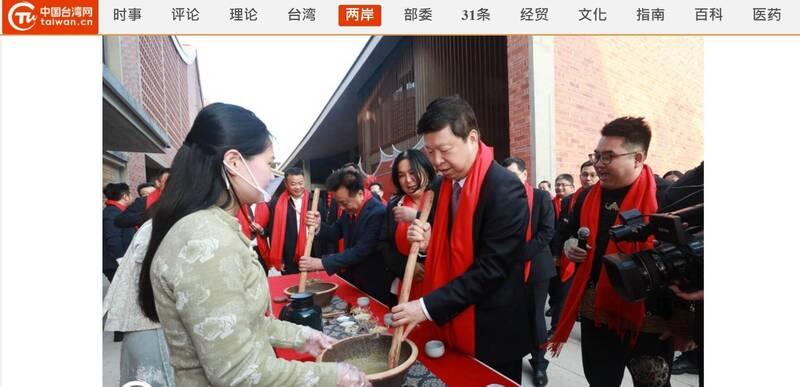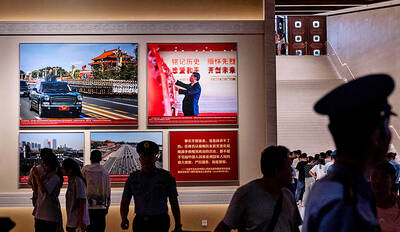China's Taiwan Affairs Office (TAO) Director Song Tao (宋濤) was joined by Chinese Nationalist Party (KMT) Legislator Chen Yu-jen (陳玉珍) at a cross-strait Lunar New Year event in Xiamen, China yesterday.
TAO posted photos of Chen and Song together at a Lunar New Year cross-strait cultural event in the city in Fujian Province, wearing red scarves along with other attendees.
“I was very touched. Chinese culture is so great,” Chen said in an interview with Chinese media about a performance by young Chinese and Taiwanese students who played guitar and performed martial arts.

Photo: Screen grab from Taiwan Affairs Office’s “Chinese Taiwan” Web site
The event was held by Chinese authorities, which Taiwanese businesspeople and residents in Fujian, as well as Kinmen locals, were invited to participate.
It featured Southern Min folk traditions, traditional cuisine and cultural heritage performances.
China’s Ministry of Culture and Tourism recently announced that Fujian and Shanghai residents can visit Taipei as part of tourist groups, Chen told the Strait Herald.
Fujian residents are already allowed to visit Kinmen, which has significantly helped the development of the island’s industries, she said.
The Mainland Affairs Council should “catch this ball” by continuing to welcome Chinese tourists, she added.
Chen went to China after the central government budget was passed, joining Song in Xiamen to celebrate the Lunar New Year yesterday.
Chen, who told Taiwan’s cultural industry to “throw away the bowl they use to beg for food” when she proposed cutting the Ministry of Culture’s entire NT$2.309 billion (US$70.15 million) budget allocated for the Public Television Service, was criticized by Democratic Progressive Party (DPP) Legislator Wang Mei-hui (王美惠) as “begging” in China.
“Doesn’t she feel sorry about Taiwan? What is she celebrating?” Wang said, adding that the KMT was praised by the TAO for its budget cuts proposal and accusing the party of “bullying” Taiwan.
Wang said Chen is a Taiwanese legislator whose salary is paid by Taiwanese taxpayers, asking “did she speak up for Taiwan? Or does she recognize China as her motherland?”
Chen was joined by Kinmen County Deputy Commissioner Li Wen-liang (李文良), Kinmen County Council Speaker Hung Yun-tien (洪允典) and representatives of clansmen associations and community groups of Kinmen as they attended a dinner party with Chinese officials.
Song was visiting Taiwanese companies in Shenzhen and Xiamen from Tuesday to yesterday.
At the cultural event, Song said he hopes that Taiwanese “compatriots” would adhere to the “one China principle” and the “1992 consensus,” and firmly oppose Taiwanese independence.
The “1992 consensus” refers to a tacit understanding between the KMT and the Chinese Communist Party that both sides of the Taiwan Strait acknowledge that there is “one China,” with each side having its own interpretation of what “China” means.
Both sides of the Taiwan Strait should work together to expand cross-strait cooperation, promote the peaceful development of cross-strait relations and expand integration, Song said.
Nearly 400 Taiwanese businesspeople and residents in China participated in Lunar New Year activities in Shenzhen and Xiamen, according to a report from China’s state-run Xinhua news agency.
Officials from Guangdong and Xiamen also participated, the report said.
Taiwanese participants offered advice on helping Taiwanese businesses accelerate improvements, sharing opportunities from China’s “Belt and Road Initiative,” and strengthening cross-strait industrial cooperation, the report said.
They expressed their commitment to firmly developing themselves in China, actively engaging in cross-strait economic cooperation and integrated development, it said.
They would adhere to the “1992 consensus,” oppose “Taiwan independence,” and promote cross-strait exchanges to maintain peace and stability across the Taiwan Strait, the report said.

Three batches of banana sauce imported from the Philippines were intercepted at the border after they were found to contain the banned industrial dye Orange G, the Food and Drug Administration (FDA) said yesterday. From today through Sept. 2 next year, all seasoning sauces from the Philippines are to be subject to the FDA’s strictest border inspection, meaning 100 percent testing for illegal dyes before entry is allowed, it said in a statement. Orange G is an industrial coloring agent that is not permitted for food use in Taiwan or internationally, said Cheng Wei-chih (鄭維智), head of the FDA’s Northern Center for

The Chinese military has built landing bridge ships designed to expand its amphibious options for a potential assault on Taiwan, but their combat effectiveness is limited due to their high vulnerability, a defense expert said in an analysis published on Monday. Shen Ming-shih (沈明室), a research fellow at the Institute for National Defense and Security Research, said that the deployment of such vessels as part of the Chinese People’s Liberation Army (PLA) Navy’s East Sea Fleet signals a strong focus on Taiwan. However, the ships are highly vulnerable to precision strikes, which means they could be destroyed before they achieve their intended

About 4.2 million tourist arrivals were recorded in the first half of this year, a 10 percent increase from the same period last year, the Tourism Administration said yesterday. The growth continues to be consistent, with the fourth quarter of this year expected to be the peak in Taiwan, the agency said, adding that it plans to promote Taiwan overseas via partnerships and major events. From January to June, 9.14 million international departures were recorded from Taiwan, an 11 percent increase from the same period last year, with 3.3 million headed for Japan, 1.52 million for China and 832,962 to South Korea,

REWRITING HISTORY: China has been advocating a ‘correct’ interpretation of the victory over Japan that brings the CCP’s contributions to the forefront, an expert said An elderly Chinese war veteran’s shin still bears the mark of a bullet wound he sustained when fighting the Japanese as a teenager, a year before the end of World War II. Eighty years on, Li Jinshui’s scar remains as testimony to the bravery of Chinese troops in a conflict that killed millions of their people. However, the story behind China’s overthrow of the brutal Japanese occupation is deeply contested. Historians broadly agree that credit for victory lies primarily with the Chinese Nationalist Party (KMT)-led Republic of China (ROC) Army. Its leader, Chiang Kai-shek (蔣介石), fled to Taiwan in 1949 after losing a